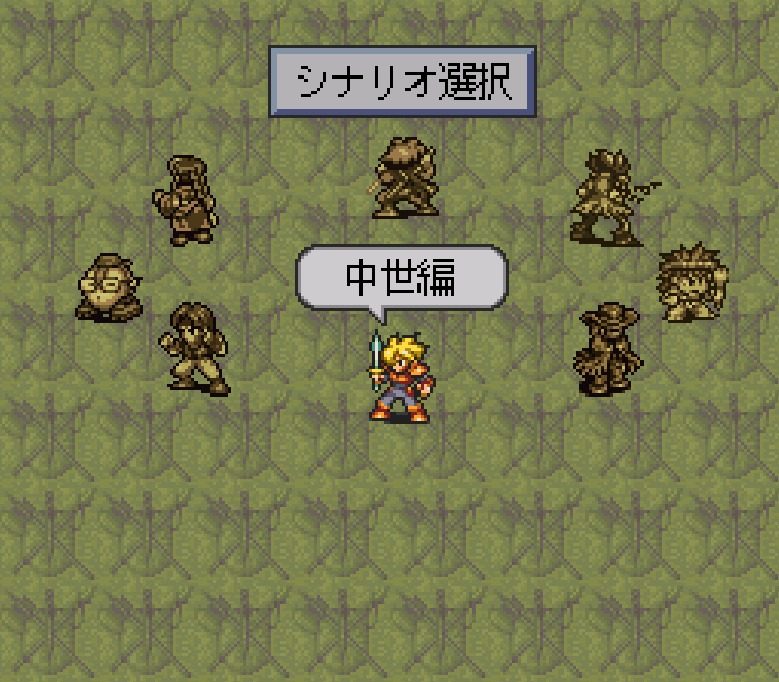
Through the seven chapters that form the bulk of its anthology approach to the RPG, Live A Live concerns itself with more unusual, smaller tales than the genre's usual fare: an outlaw must team up with the lawman on his tail to save a village under siege by bandits, for example, or an elderly kung-fu master must find and train a pupil before his aging body fails him. Its approach is so unusual and creative that its eighth chapter, the one that unlocks upon beating the other seven, raises eyebrows - and suspicions - by being so expected.
(SPOILERS for Oersted's chapter and late-game to endgame Live A Live, starting in earnest under the cut.)
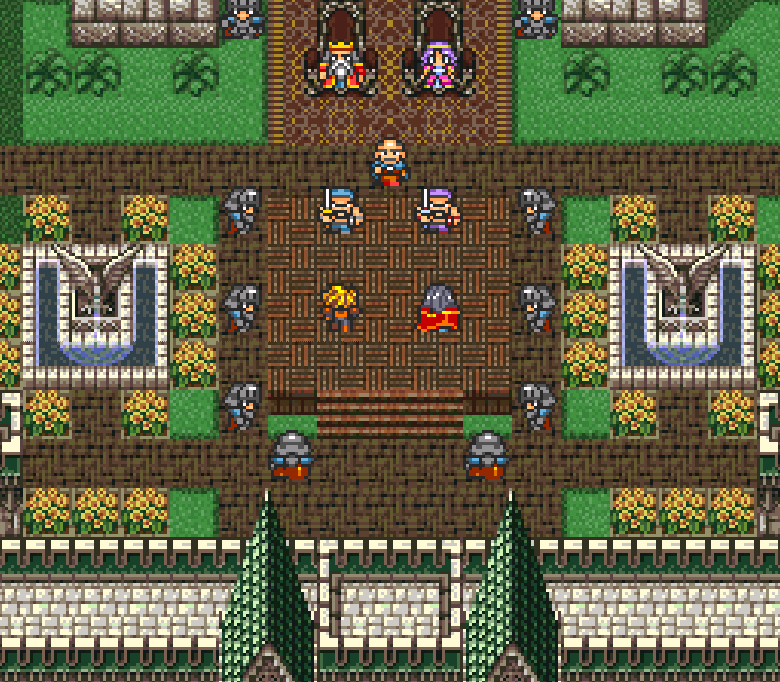
The basic plot is so rote it's downright suspicious: in a fantasy medieval kingdom, the princess is abducted by a dragon, and the king's best knight must rescue her and save the world from the Dark Lord to claim her hand in marriage. The genre has told us for so long, however, that the real heroes are young male knights with swords that the content and placement of this medieval tale sets certain expectations: that (as with, say, Dragon Quest IV) the game is clearing the way for the real story to begin. Yeah, we've had the stage set with all these weirdo losers' piddling problems, but at long last, the real hero is here! Time for the real tale to begin! And, mm. Mmmmm. No. No, sir. That's not what happens at all.
(Note: I played the Super Famicom version, so I'm using the names from the Aeon Genesis translation. You should be able to figure things out. I've included a good deal of plot summary in the first half, as I think there's some worth in going over exactly how things go down. If you're in a hurry, you can jump to the PLOT SUMMARY ENDS HERE notice.)
The story starts all validation and hosannas, as the hero, Oersted, bests his best friend/eternal rival Straybow in a tournament to win the princess's hand and the throne of the kingdom. The princess (who seemingly has not met our hero before: "Oersted, was it?") instantly swoons over his sword skills and manliness, cue abduction. Oersted, Straybow at his side, is tasked by the king with recruiting the great hero who vanquished the Demon King the last time for the princess rescue, but the calamity is almost taken as a job opportunity for Oersted: declared this generation's Hero - even though he hasn't done anything yet - his assured victory will serve to cement his position as the idol of the land. As he makes his grand departure from the castle on his epic quest, the townspeople line the streets for a glimpse of him, feeling privileged and grateful just to be in his presence and to gift him with their possessions. Who needs to play the rest of the chapter? Oersted's already won just by being him.
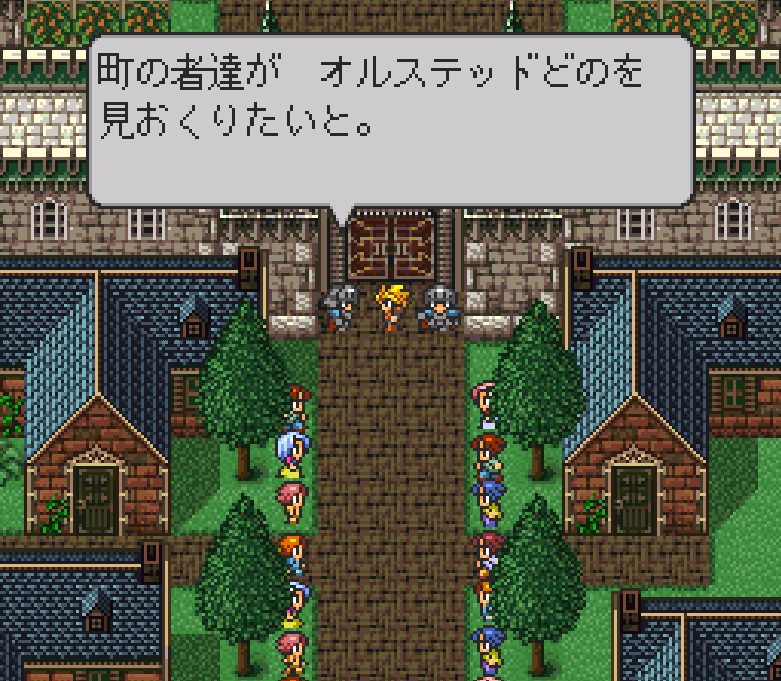
Again: for a game that's devoted itself to telling relatively offbeat stories for the genre, this hews so close to RPG archetypes that anyone who's played this far will be wondering what's going on. The first major crack comes when Oersted has to venture into the wilderness to recruit the old hero, a man named Hash (Hush? Hasch? The Aeon Genesis translation uses "Hash," so let's go with that for convenience). Hash is a strong and skilled combatant, but characterwise, he has nearly nothing heroic about him. He's retreated into solitude in response to the overwhelming adoration he received from the townsfolk, but no sense of humility apparently accompanied this decision; instead, from talking to the man, he genuinely seems to hate the people he protected. When he finally takes up his sword to join the quest, it's only because his self-image was insulted - his old comrade, a monk named Uranus who has joined Oersted's quest, called him a "coward." The scenes of him taking up his sword again, of reopening the entrance to his old foe's lair, aren't about saving the innocent life at stake or restoring peace to the land - they're monuments to his ego, as he casts the conflict as a dick-measuring contest between himself and his old personal nemesis. (Thoughts of Cloud's insistence at FF7's climax, far past the point at which he should have known better, that the conflict was all about his personal beef with Sephiroth when the fate of life itself was at stake passed through my mind.)
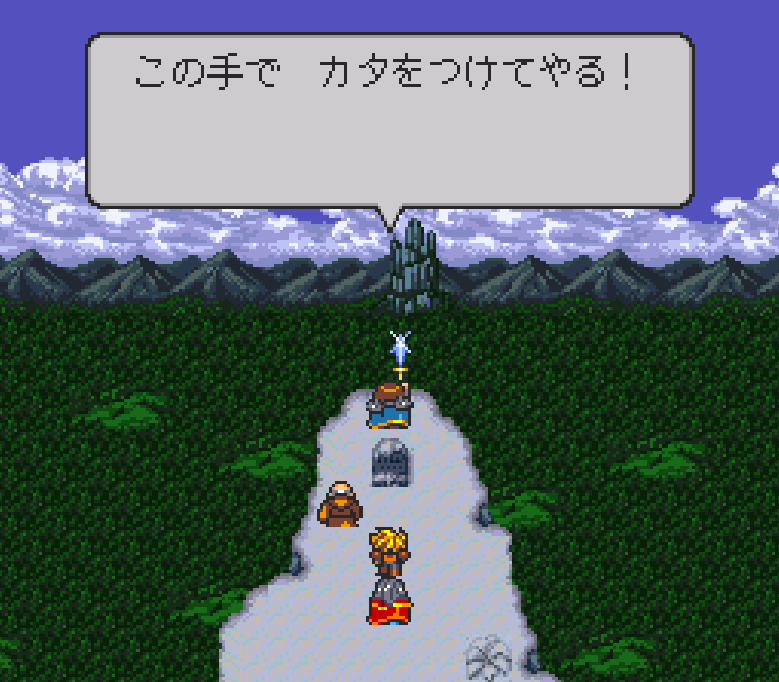
Hash will prove only a half-enlightened hero, but he lives, it turns out, in a country of the willfully blind, and the chapter ultimately serves to illustrate the wisdom of his defining, initially-curious decision to withdraw from the society that adored him. Though the goal of so many RPGs is to have its hero lauded as the Bestest Ever - given his every wish in terms of fame, skill, honor, and romance to serve as an avatar of a power fantasy for the player - it is, in fact, unhealthy to have an entire world set up to validate you.
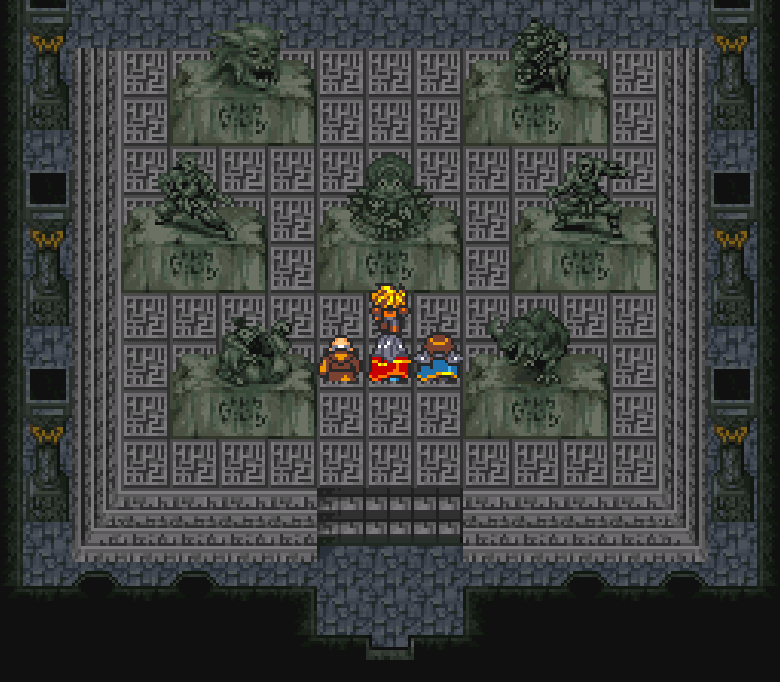
The first hint that the aggressively-, suspiciously-facile premise of Oersted's chapter might hold more significance and complication than it initially lets on is the presence, in the antechamber before the final battle in the boss's lair, of statues devoted to each of the bosses of the preceding seven scenarios. Until now, the only factor linking the scenarios has been the curious matter that every final boss, though possessing a completely unique identity, has been named some version of "Odio" (referring to the Latin word for "hatred," not Garfield's nemesis), but this has so far gone uncommented; this statue room is the first acknowledgment of an explicit connection.
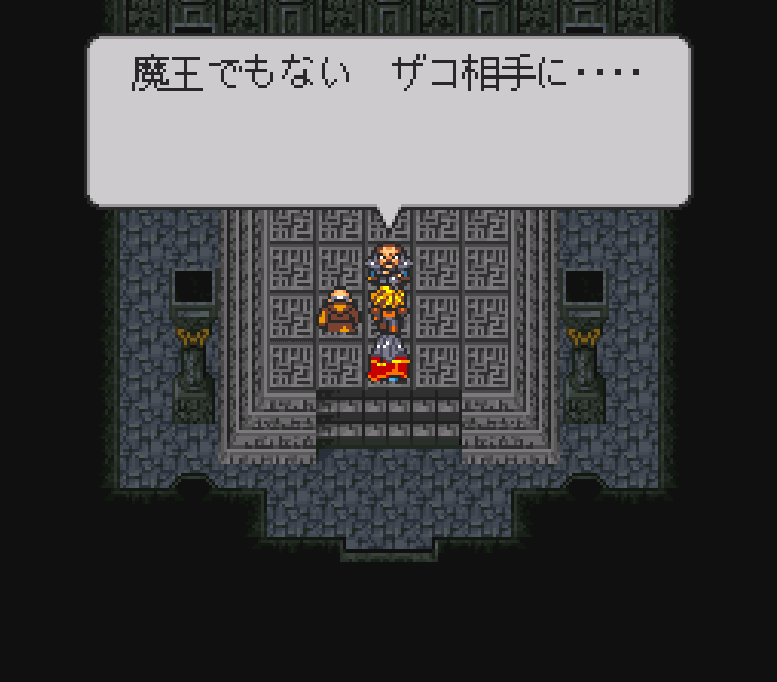
The second hint, and the point at which the premise starts to go off the rails, comes when Oersted and party obtain their "victory" over the Demon King. One, as Hash indignantly proclaims, the Demon King isn't THE King, not the one Hash defeated. Elsewhere, this would be a setup for a Zeromus-like final final boss, but here, it's just left hanging as a mystery. Two, even though he won so easily he's outright insulted, Hash nevertheless collapses - his body is actually fighting a losing battle against the more difficult opponent of terminal illness. When asked by a shocked Uranus why he came on the quest anyway, Hash cites how one cannot refuse the hero's call once awarded those laurels, but given his outright angered reaction to his foe's fake identity and weakness, it seems also that he came along for a last taste of personal glory - to meet his end in hallowed battle against his old foe. Nevertheless, he advises Oersted to press on and save Princess Alicia - to reward the faith she has placed in him - before succumbing. However, further tragedy is waiting: the room collapses, Straybow fails to escape the cave-in, and, unable to find a way forward to where the princess has been stored in the late Demon King's lair, Oersted, accompanied by Uranus, wanders back to the castle.
Oersted runs (somewhat comedically, in a darkly-humorous sense) past the still-lined up, still-adoring crowds of people to tell the king Hash is dead. His Majesty loses it briefly, then, at a loss, tells Oersted to catch a night's rest in the next room. After dreaming of the princess being menaced by the Demon King, Oersted will awaken to a ghostly illusion of Straybow attempting to lead him out of the room. Slipping downstairs, Oersted discovers the same Demon King from his slumber sitting on the throne. Confronting him will wordlessly initiate a battle; as if acting out a nightmare, Oersted will have no choice but to attack. When the foe is felled and when the lights come on, Oersted will find he has been the victim of an illusion: he discovers that he has slain the king.
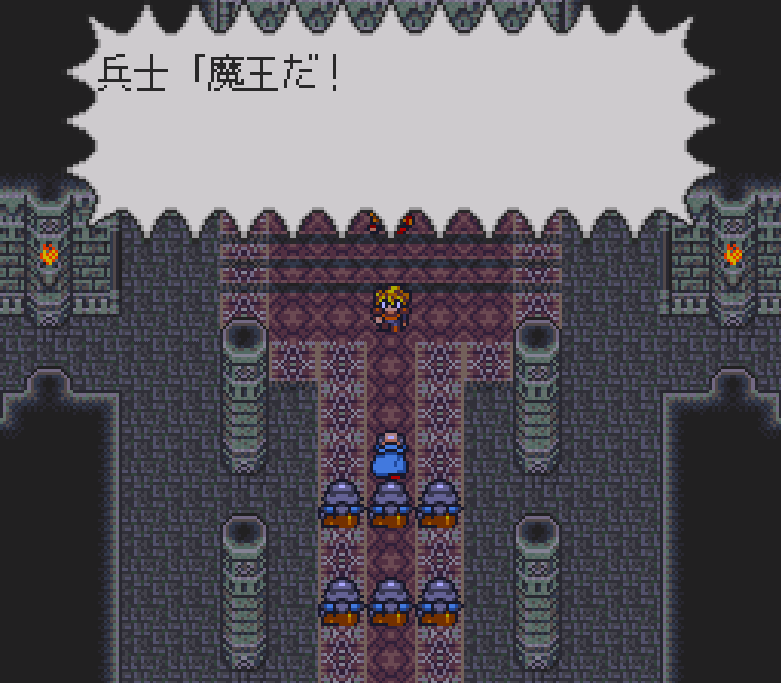
Regicides do not engender understanding, but there is even less here than one would expect for our poor hero. The unthinking herd mentality that boosted the loyal knight to the land's universal adoration turns on a dime on Oersted. Though he initially enjoyed his countrymen's undying, unthinking loyalty once boosted to fame and prominence, the flip side of that - the ugly side, one unleashed fully on Oersted - is that there is no room for confusion or extenuating circumstances or anything but black-and-white simplicity in this little kingdom's mentality. Upon seeing Oersted standing over the king's body, they instantly, unblinkingly conclude Oersted to be and have been, now and always, pure evil - he must be a monster, he must have deceived them all along, he must be the slayer of Hash and Straybow as well. The late king's minister proclaims the "obvious" truth: that Oersted is the "Demon King." When Uranus calls for calm and attempts to be the sole voice of reason, they brand him a traitor also, saying it's the only way he could have come back from the Demon King's lair unharmed. They take Uranus's pleas to Oersted to flee as further evidence of collusion (ignoring that they themselves ordered Oersted to leave moments ago). Oersted runs out through the streets to shouts of "Demon!", past the shuttered homes where those who once showered him with adoration scream at him in terror and hate behind locked doors.
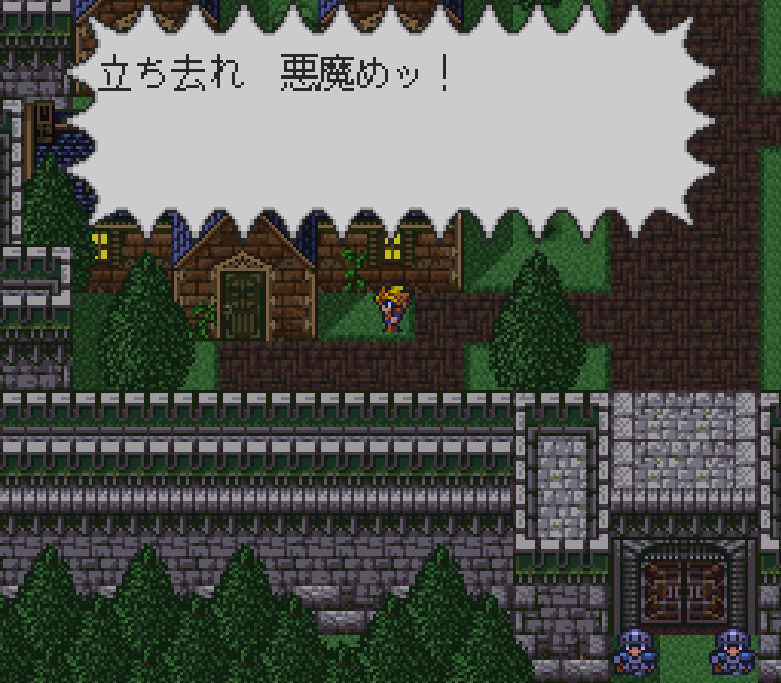
Oersted can wander, but he'll find only a wall of fear and castigation from anyone he meets. (The enemies, meanwhile, will have assumed even more twisted, monstrous forms of themselves, perhaps reflecting Oersted's deteriorating mindset.) He'll ultimately have no place to go but back "home," where he'll be arrested and scheduled for execution.
A half-dead Uranus lies in the neighboring cell. The monk reports that they tortured him; he now understands, he says, why Hash hated humans. He still retains faith in Oersted, though - faith that, Uranus reminds Oersted, the still-captive princess shares, regardless of the current calamity. Uranus implores the young knight to protect what Hash, and now he, will have died to defend. He casts a spell to release Oersted from his confines and dies himself.
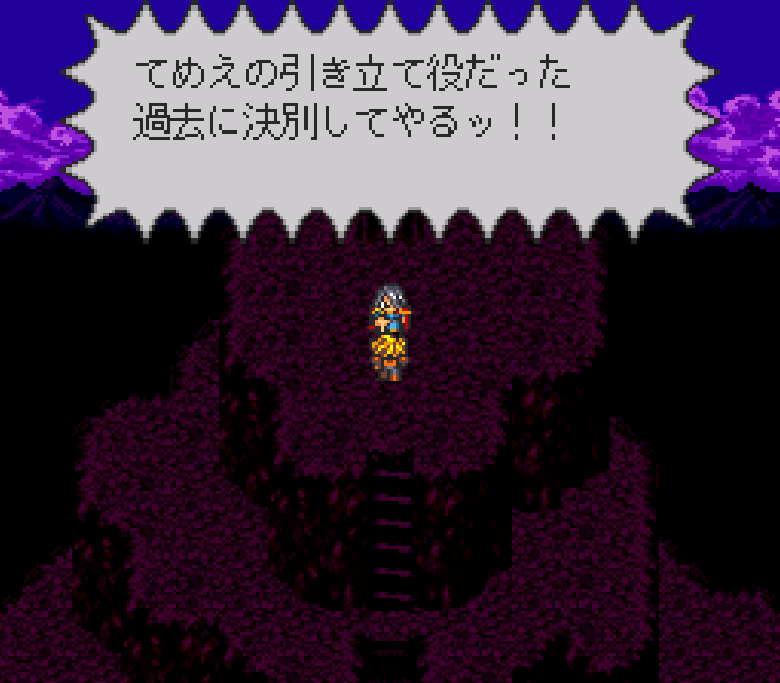
Oersted fights his way back to the mountaintop to discover...Straybow, alive and well, and the mastermind of events. When the party raided the Demon King's lair, Straybow explains, he spotted an access point to a secret passage that everyone else missed - where, he intuited, the princess had to have been held. His mind became inflamed with the prospect of glory that had always been snatched from him by the king's eternal favorite, and he decided then and there to fake his death and rescue the princess himself - framing Oersted for the king's demise to ensure he was out of the picture. He berates Oersted for always swooping in and taking whatever he wanted - no matter how hard Straybow worked. Oersted's hero's journey cast Straybow as the eternal second fiddle to Oersted's golden-boy life, existing only to make another human being seem better. That's no way to live, and Straybow won't take it - not anymore. He rushes, and Oersted engages him, as the triumphant strains of "Megalomania" play.
It's not a triumphant battle. Straybow is as closely-matched to Oersted as he was in the opening scene, and he won't prove much challenge. In my game, this fight was nothing but a nasty, sad beatdown on both sides, one that Straybow again loses - this time, fatally.
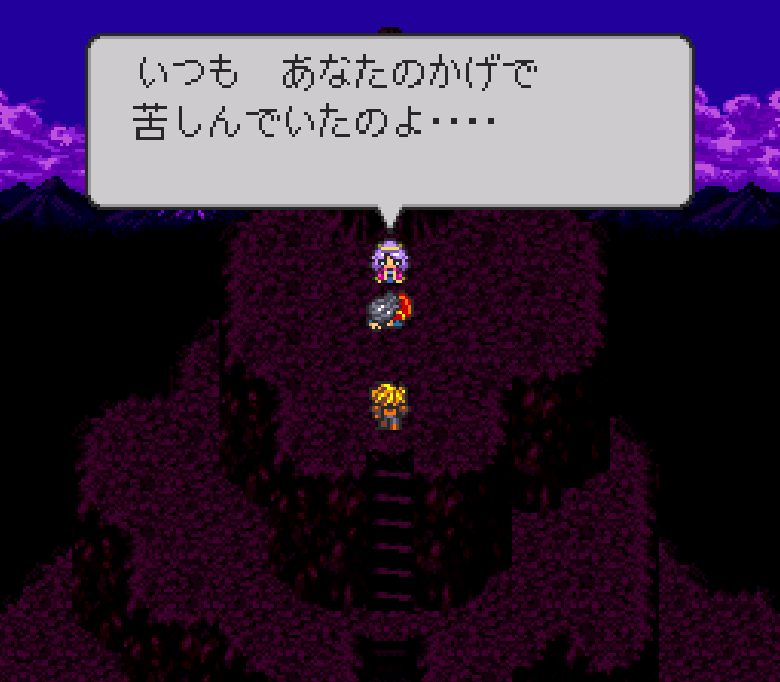
It is at this point that Alicia finally reemerges in the story, but not to throw herself into Oersted's arms; she instead reacts with horror at the sight of Straybow's body. Oblivious to Oersted's own struggles, she asks why he didn't come for her, after all her waiting? Straybow did, though, and her undying love, so quickly conferred upon Oersted after winning a couple swordfights, has just as easily transferred to him. "He always suffered in your shadow," Alicia laments, while Oersted the perfect golden boy never knew the pain of not having what he wanted. Alicia promises Straybow that he won't feel that pain anymore; she'll be with him forever. She draws a knife across her throat and dies, leaving Oersted all alone.
There is silence, then a low rumbling on the soundtrack as Oersted's mind finally breaks. He thinks back on all the lies, all the promises that didn't come true, on both his part and others'; on so instantly being denounced as a demon. Oersted has until this point been the typical 16-bit JRPG silent protagonist. It is here, with nothing left, that he finds his voice. "I... There's nothing left for me... No place to return to... Nobody to love... No one to believe in... There wasn't even any Demon King..." Oersted pauses for a moment, and as his brain breaks in despair and long-suppressed anger at his unjust end, he at long last succumbs to the fate nearly every human in the story has attempted to impress upon his head. "In that case... I will be that demon... I will teach humanity the error of its selfish ways!" Consumed with thoughts of vengeance, Oersted declares himself the Demon King Odio, and the credits roll.
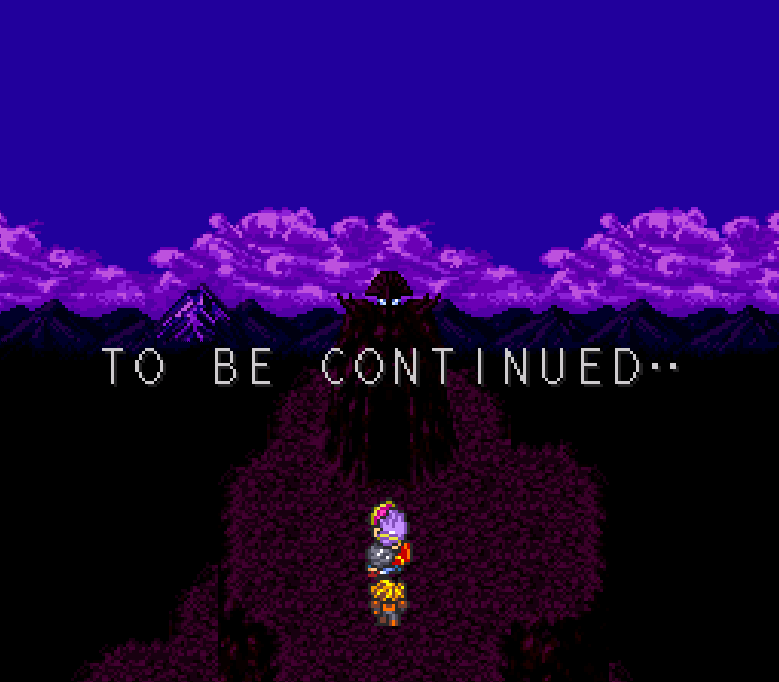
(PLOT SUMMARY ENDS HERE. Meanwhile, it's interesting to note that the game never resolves the matter of the nature of the entity that kidnapped the princess in the first place - the enemy dismissed by Hash as not the Demon King. This may be intentional, as the game ultimately argues that the exact identity of these foes is somewhat beside the point; see below.)
Throughout his chapter (most of it, anyway), Oersted seems to be - is - absolutely not a bad guy. Despite being initially in a charmed position, he's not a bully or a braggart and earnestly wants to do good. He feels a genuine sense of responsibility toward Alicia and regret that he didn't prevent her from being taken, as per the little sepia-toned reflection he'll have if you press A at the overlook atop the castle. (His sprite looks down. That elicits pathos.) It's not just about getting fame and glory for him. His assumption of the mantle of Odio has as much, if not more, to do with him being the vessel for all his ill-formed world's hatred as it does with his own hate. His problem is the same as his countrymen: he is unquestioning. He's passively entitled. He doesn't think about why winning a couple of sword duels should net him the princess's hand or the throne of the kingdom or the townspeople's lavish adoration, delivered as they line up row upon row for a glimpse of him. This is the typical bounty delivered unto an Alex from Lunar or a Cecil from Final Fantasy IV, yes, but one person's deservedness of all this - the responsibilities, and costs, entailed - doesn't seem to come into question in Oersted's mind. Again, there's no indication, before everything happens, that Oersted has done evil or plans to do evil with all he's been given. As he laments after his fall, he just wants to do right. He just happens to be a very conventional RPG hero in a game that's all about questioning RPG conventions.
Through Oersted's tragedy, Live A Live is indicting the archetypical RPG story, and its failings, in the game's eyes, are manyfold. Foremost among them is the RPG convention of having a whole world set up to validate one character. As observed above, in a video game, this serves to feed a power fantasy for the player, experiencing the game world through the hero avatar and recipient of attention. You're viewing the world solely as a dispenser of validation: you save it, everyone lauds you. Yes, this is a video game, but there are problems with indulging impulses, however well-intentioned, that encourage you to see the world like this, and Live A Live decides to illustrate them by showing their impact on others (you know, the others who exist solely to prop you up; the others you're effectively ignoring) in the world they create and the complications that result. For one, as depicted through the very salient example of Straybow, there's the obvious issue that, you know, others have emotional needs, too, and letting those go frustrated, while the consequences may not be as dire as global depopulation, does not make you a very good friend, no matter how noble your intentions are otherwise.

(A small aside here: the Oersted-Straybow situation brings to mind the Kain-Cecil rivalry from Final Fantasy IV; Oersted's "class change" takes place on a mountaintop not a million miles removed from Mt. Ordeals; Oersted's red-and-yellow palette and swished hairstyle are reminiscent of the early chibi representation of Cecil (itself based on the traditional FF Fighter) from material like the cover of the Final Fantasy IV Minimum Album. FFIV and Live A Live share a scriptwriter in Takashi Tokita. It's interesting to entertain the idea that in calling their genre into question, the Live A Live staff had the audacity to make the hero from their foundational hit on the Super Famicom platform into their villain here.)
For another: well, what kind of people would provide the reflexive, adulant puffery this scenario demands? Sycophants, that's who. In fact, let's take a look at this little land designed for the benefit of one person, because Oersted's not the only one who's willfully-blind or does a dramatic about-face. The population of his kingdom is shallow and unthinking to a degree that eventually proves downright frightening when it's not leveraged in the hero's favor. The townspeople fall lockstep in with whom they're supposed to love and hate. The guards throw away Uranus's reputation, word, and past great deeds like so much trash, brutalizing him without reservation or remorse. Alicia "falls in love" instantly; she wants Oersted because everyone says she should want Oersted, and her position as a princess demands she be in undying love with somebody. She switches affections to Straybow because, in her eyes, he came to her rescue and Oersted didn't; she never stops to think that Oersted might have been on his way, or what Oersted suffered in the attempt. Her crowning diatribe to Oersted stings because it has a kernel of truth to it, one coherent with Live A Live's themes, but it's just parroting the perspective of the new, swiftly-changed object of her affections.
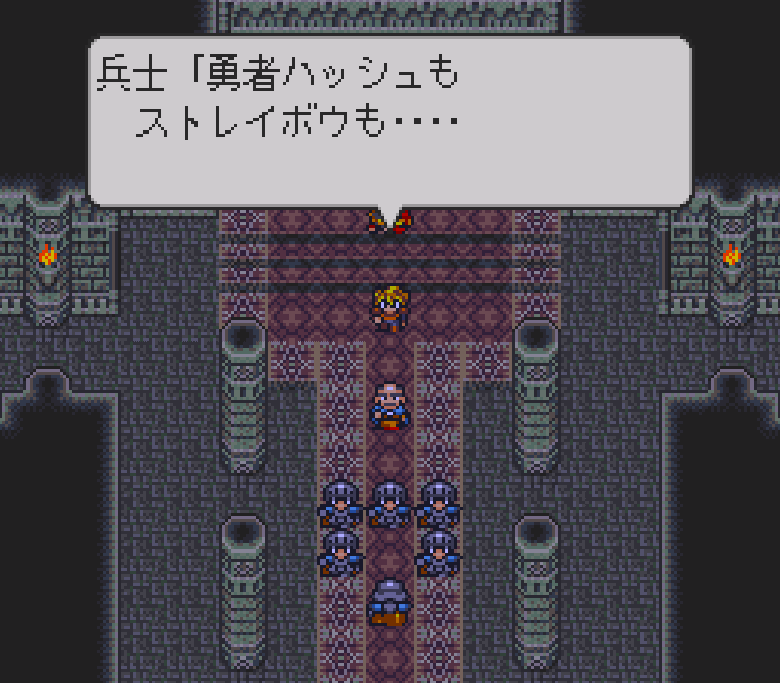
Everyone in this scenario (save for Uranus and, halfway, Hash) is not only unquestioning but proves remarkably devoid of integrity or moral backbone. Straybow happily tries to slaughter Oersted and has no problem causing the death of his king. Alicia changes loyalties at the drop of a hat. The guards have no problem torturing someone who saved their lives. Oersted is bodied in this chapter, and he resists for a good, long while, but even he, eventually, is OK with mass murder.
None of these supporting players are good, in a meaningful sense. How could they be? They have to be simple-minded and unthinking because that's what the scenario demands of them as sources of unilateral validation, and that lack of questioning makes them more suspectible to embracing hatred and committing or fostering evil. They have to be in these little boxes to serve their roles in the hero's story, and much of the tragedy in the tale comes from the supporting cast's inability to see beyond them (Alicia) or frustration in futilely straining against them (Straybow). Yeah, none of us in the real world are in danger of socially-engineering our own cheerleading sections, but the message for us here is: though it's frustrating when you're overlooked in real life, a society for the benefit of one would be a dark one, its plaudits meaningless, its inhabitants not the type of people who'd approval you'd want. Oersted is a hero by the dictates of the story, but he's also, through the dictates of his role, a source of moral rot.
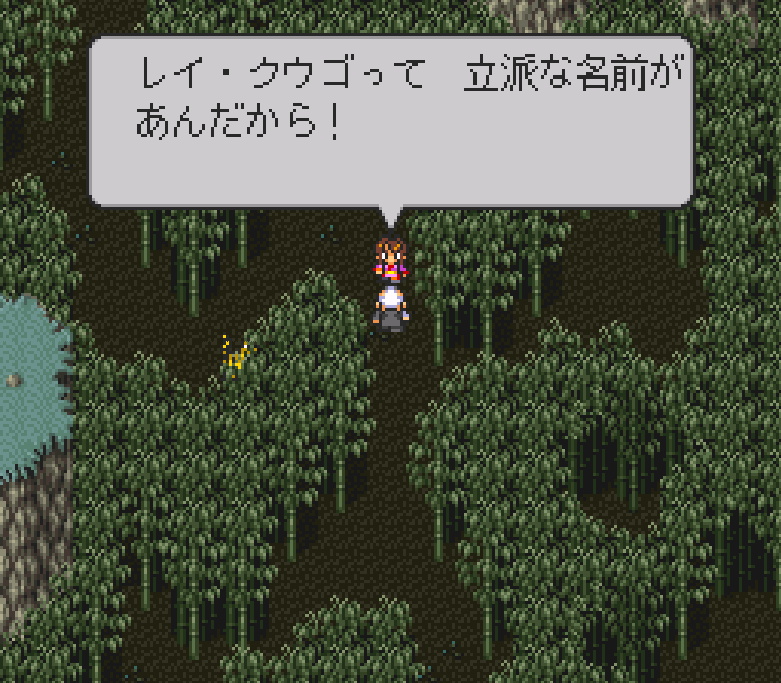
Contrast this to Live A Live's other scenarios, which are constructed to provide a counterpoint to the prevailing utilitarian attitude toward the non-hero among RPGs. For one, instead of validation, all of the seven main scenarios, to varying degrees, have a heart of the lead character coming to question their core beliefs. The Master comes to understand that anointing a successor means, once they are ready, actually letting them take your place. Oboromaru, an unquestioning killer for hire, is challenged by a political reformer motivated by ideals. Sundown, who's spent his life alone and on the run, has to plant himself in one spot, examine it thoroughly to work in its defense, and leave things to others, learning enough about the townsfolk to appraise their capabilities. Takahara, devoted to the pursuit of strength, learns the dangers of when that pursuit is single-minded - and that even attaining strength fairly brings its own issues. Akira vows to become stronger and self-sufficient, but he has to puzzle out how to use his powers to his advantage with every step, and revelations call into question his vow of vengeance. Pogo feels something new and decides to stay true to it, which leads to him to be cast out of his tribe and learn new ways of living, form alliances with old foes, and eventually bring everyone to a new status quo. Cube is too new and pure of heart to harbor prejudices, but his chapter has a potent illustration of this theme in Darth refusing to act out his role, instead joining forces, grumpily but decisively, with the being he once disparaged - then genuinely coming to understand and accept that being, out of heartfelt appreciation and mutual connection and not just necessity, in the aftermath.
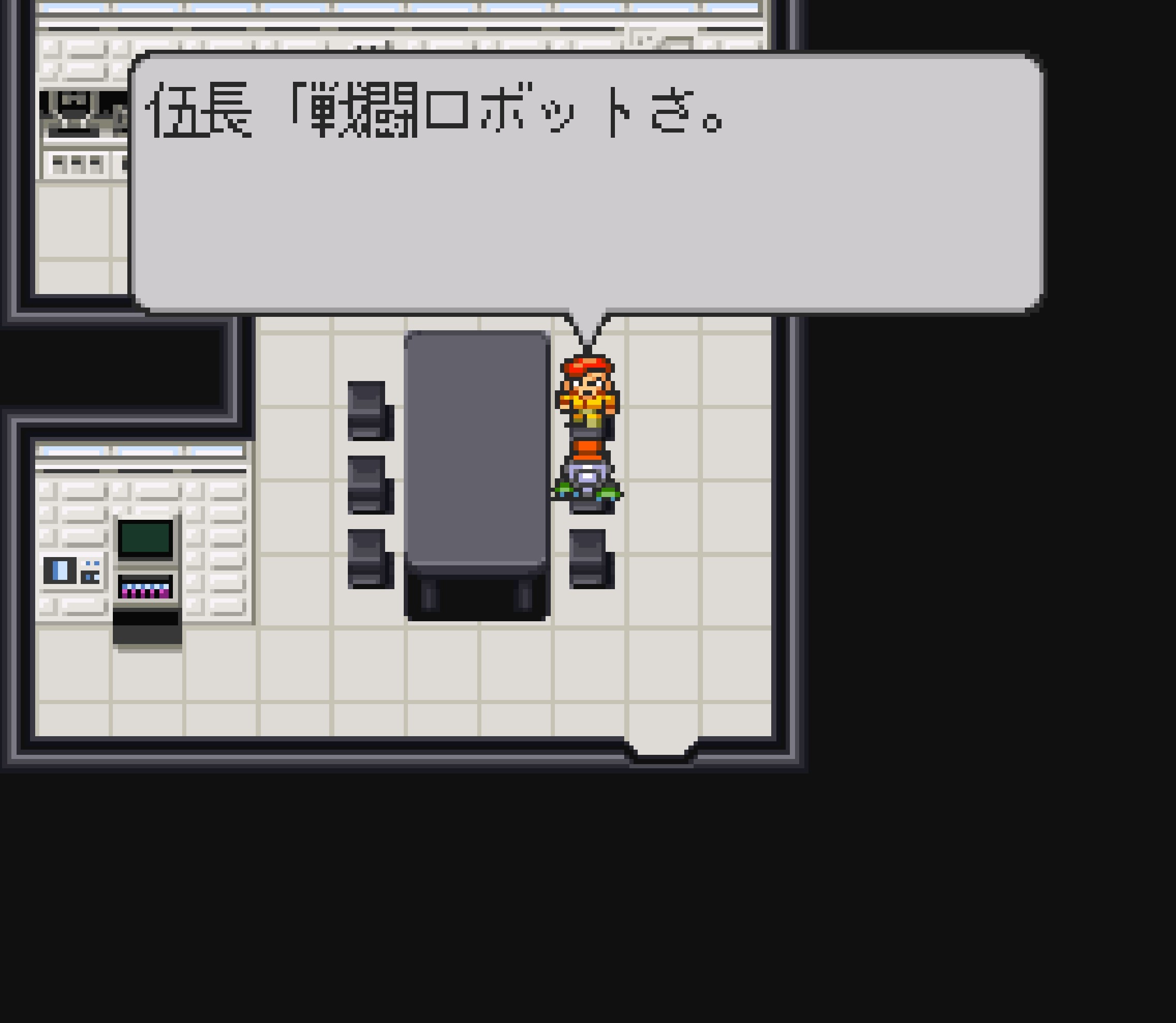
Live A Live's anthology approach not only provides the player with a breadth of experience - sympathy with several viewpoints - but the specific stories it tells are designed to communicate how putting yourself and others into predetermined roles, into boxes, not only minimizes them but closes your horizons. That is deadly to your own moral development, for Live A Live argues that you cannot be a fully good person without going out in the world, having your own view challenged, and reassessing and reshaping yourself in response, retaining your sense of self but allowing your experiences and connections with others to change you. (It also gives you integrity when you do identify what matters; contrast what happens when a person whose entire world is designed to validate him is finally deprived of that validation. Those dependent on external approval prove fragile when it's taken away and have difficulty finding their own path.) Simple-mindedness, black-and-white thinking: these are all paths to evil. Questioning your world, your perspective, and yourself - opening yourself to new experiences, taking the time to understand others and viewpoints not your own - is essential to forming an ultimately strong sense of self and what's right, to being good.
The smaller scope of the individual stories - saving a village, finding someone to carry on your professional knowledge - feeds into a corollary of this, which identifies the JRPG need to Save the World Entire as another form of brushing off one's fellow humans, pigeonholing one's fellows as bit players in your own story. A global scope turns everyone else into an indistinguishable mass, background noise, while a focus on smaller stories asserts the importance of every human on stage. You don't need to have the whole world at your feet; those in your everyday life already matter, as does how you treat them.
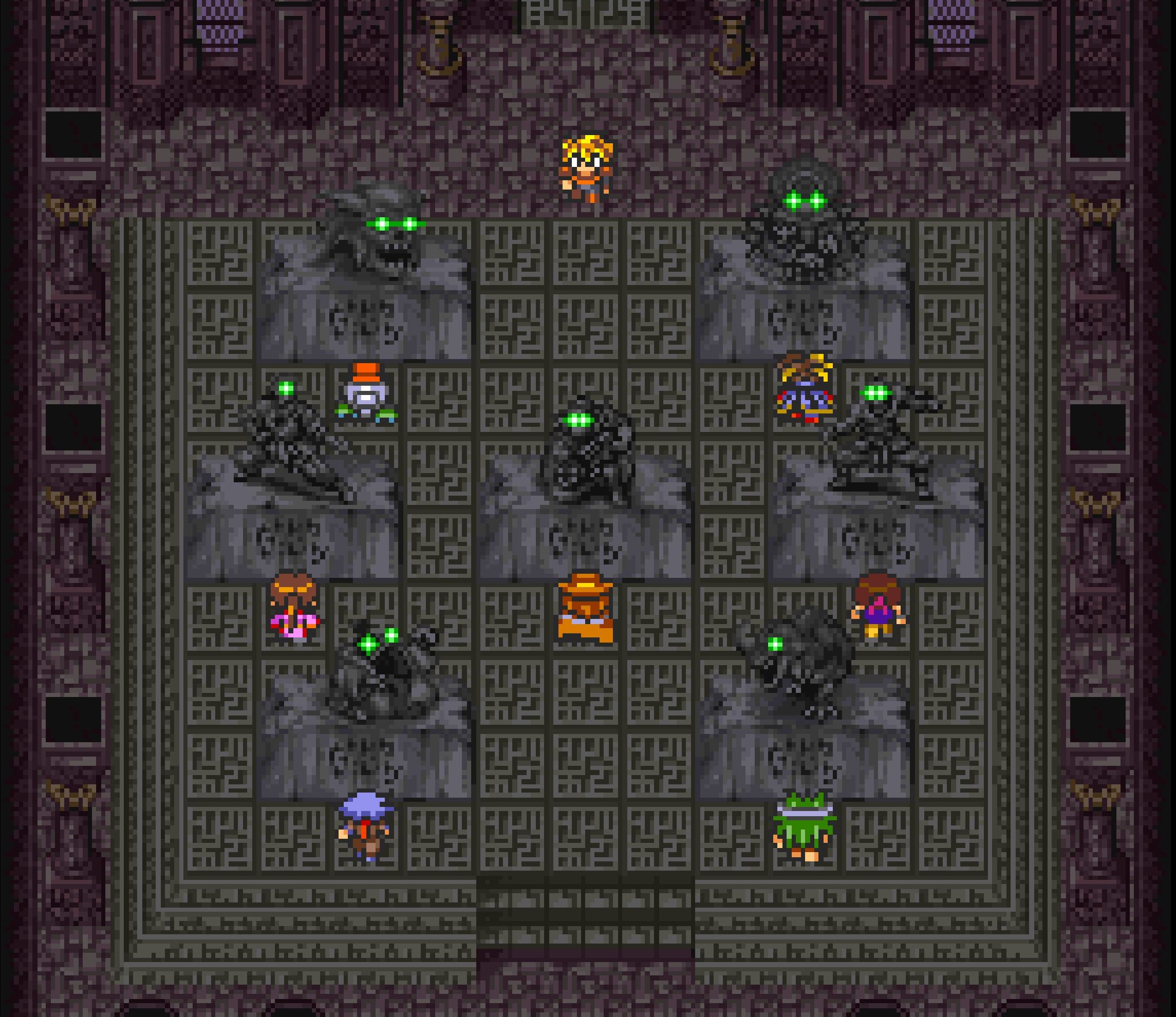
If you take a peek at the bad ending - what happens if you pick Oersted as the protagonist of the final scenario - you'll encounter a curious thing about Oersted's worldview: he clearly identifies being evil with defeat, swearing that the heroes of the world will learn what it is like to "be the vanquished." He wasn't defeated, though; combatwise, he won all the way. In Oersted's mind, however - and in the value system of this kingdom created to validate him, in the archetype of the RPG hero - being good and being the best are conflated. From this perspective, it makes sense for Oersted to be obsessed with the idea that if he is bad, he must be a loser, and vice versa. In the Bestest Ever archetype storyline, an avatar of righteousness who becomes an all-powerful force of nature as he comes into his own meant to serve as assurance of the ultimate triumph of good, but when it's bound up with personal validation for character and player, particularly as presented in a typical RPG, this idea can be corrupted, skewed into might making right. Oersted's real issue here is that he was thrown out and branded a monster by his people. He's trying to resolve that in the typical RPG hero tradition, by beating stuff up real good - which is both the way you "prove" yourself to be a good person and the way you solve problems.
Oersted's ending leaves him wandering bereft through a depopulated world, the strongest, best - and only - thing in it. This is Live A Live's illustration of what it sees as the endpoint of the archetypical JRPG story - the hero stands atop all, has asserted his might over the entire world, stands at the pinnacle. And yet it all tastes like ash. In the main path, where Oersted's attempts to lash out are rebuffed by the other characters, he howls in pain: why can't he win? Is that the pain he's feeling, though? It seems more accurate to say he's frustrated that he can't lash out further at a world that hates him. But as we see in Oersted's ending, victory there will bring him no happiness, either. I chose Sundown for my lead in this chapter, and though the cowpoke may not seem suited for this task, his at-a-loss, seeming non sequitir of a response weirdly finds his way to being right on target: "The more I run away...the more I isolate myself... the more I get to wanting the warmth of human companionship..." It's a small moment, but it's very much in line with Live A Live's theme of examining one's personal experiences and using them to connect with and understand another human being; Sundown identifies his pain in Oersted's. And the message itself hits its mark: All Oersted's vengeance and violence has gotten him nothing. Victory brings him no happiness. As Sundown says: the further you push people away, the deeper the wound gets.
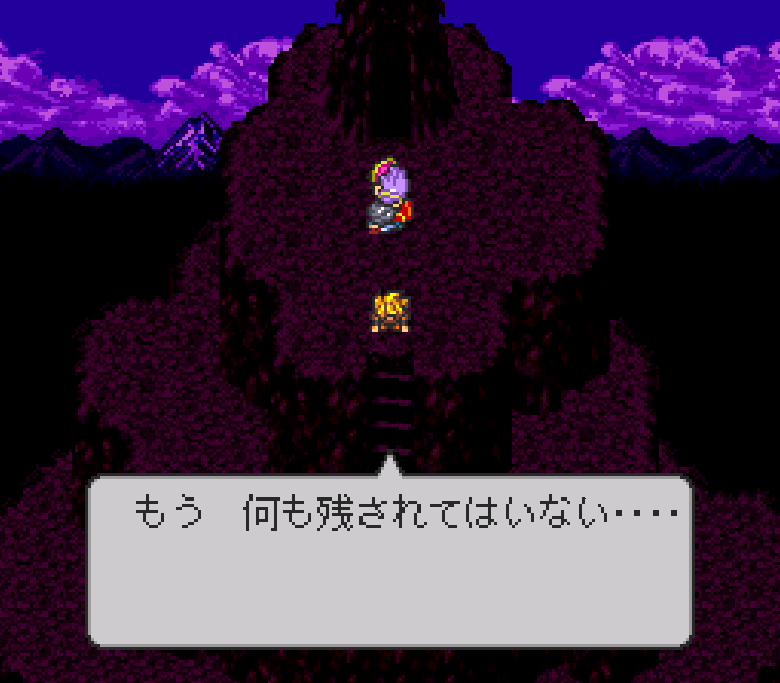
Oersted became an avatar of hatred because he lost everything that mattered in his life - because no one would listen to him when it mattered, not really. This is another undermining of RPG assumptions: do you really want to be the god-king? Or do you just want to be heard, understood, important to someone? Oersted's given up on pleading his own case by this point, but Sundown does hear what he's saying.
The conceit of every character's ultimate foe sharing a common name isn't really given a satisfactory practical explanation (they're all present in statue form in the Demon King's lair, and Oersted can manipulate these statues and the entities they represent as Odio, but who made the statues?), but the whole "Odio" idea is meant more as a metaphor. Everyone's ultimate enemy - "everyone" here being not only the protagonists but humanity in general - is not a person; it's a concept, an attitude: hatred - self-obsessed, selfish hatred - given life by many different avatars throughout history but always resurgent. As the game not-so-subtly states with Oersted's dying breaths in the ending (and repeats immediately in an over-the-screen chyron), anyone can end up a Demon King, an Odio. Most titles in the genre end with a reminder that anyone can be great or make a positive difference; while I think Live A Live would agree with that, it's significant that it chooses instead to end with a reminder that anyone can cause great harm as well. Consistently, it's less concerned with validating the player and more concerned with making them aware of the potential impact of their actions on the larger world. Don't be a Straybow, seeking the spotlight regardless of the cost to others, or a Oersted, oblivious to the lives of those around you. (It's not for nothing that Odio's battle theme is titled "Megalomania.") These are simple morals, but Live A Live's message is how even the good vs. evil fairytale stories of many RPGs fail to teach them, and can in fact end up fostering ways of thinking and seeing the world that are antithetical to them.
The ultimate enemy is hatred. How do we overcome hatred? One, stop sleepwalking through life in predetermined roles. Live...alive. Two, open yourself up to a larger range of human experience - and try to understand and connect with your fellow human beings.


Comments
I originally was still somewhat hazy of how each character exactly fits into this deconstruction, but you really put everything into words perfectly! I loved how you analyzed Straybow, the towns people, and Oersted. It also aligns so much with Akira’s harsh scolding of Oersted’s hypocrisy of hating humans while being one himself, since he in a sense is just as passive and unquestioning as his kingdom. The meta critique on validation in JRPG also perfectly aligns with what Uranus told Oersted in the cell, where as long as 1 person believes in him, he should keep on fighting and forgiving, which is why he should save Alicia to also help validate his innocence in a sense. In hindsight it’s quite a dangerous mindset since what if no one believes in you? I agree with you how Sundown’s definitely a more positive counterpart to Oersted in this case, and how despite being a complete victim actively conspired against, Oersted’s validation complex in the lens of a JRPG hero also played a part in his downfall and inability to recover. He didn’t only start to become a megalomania as Odio, but already cultivated some hidden seeds even as the hero despite being all kind, responsible, and earnest.
Also finally I love your take of how it connects to live a live and the other chapters to shine through each other, where it’s not just deconstruction for the sake of it, but has such a strong and bittersweet moral!
Sorry for the long reply, but I just wanted to say I really love your analysis! And I’m so glad to be able to find this hidden gem of a game, and quite dumbfounded that it has such a smart deconstruction and strong moral back in the 1990s...
Sundown seems like the popular choice for the last-chapter lead, based on the other videos and posts I've seen. Who wouldn't want to be the Man with No Name, right? It'd be interesting to see a breakdown of how many players chose each character.
Also, picking Sundown is a great choice and I love his line too. I love how every protagonist can kind of relate and connect with the 'villain', really driving home the game's themes. Good stuff.